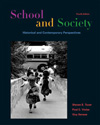Chapter 2 treats political economy, ideology, and schooling in the 50 years after the American Revolution. Chief features of the political economy of the early republic include an agrarian economy, a decentralized republican government, relative homogeneity of local culture, and a social hierarchy defined by race and gender. Ideologically, the origins of democratic thought in early America can be understood in the context of the breakdown of feudalism in Europe and the rise of classical liberalism in Europe and the United States. Each of the following features of classical liberalism helps define the character of the ideology shared by Jefferson and his contemporaries: a commitment to human reason, a belief in a universe governed by natural law, a conception of human virtue shaped by sacred and secular influences, a belief in the inevitability of progress, a growing sense of nationalism, and, finally, a many-sided concept of freedom. The classic liberal commitment to education (and, for Jefferson, free public education) can be understood in relationship to each of the components of classical liberalism identified above. To examine Jefferson's beliefs about popular schooling requires an understanding of his views about the relationship between participatory democracy and education. In addition, his conceptions of mind and learning theory were grounded in "faculty psychology," which compared the mind in part to a muscle and in part to an empty vessel. Therefore, for Jefferson, formal education needed to be both broad and rigorous to sufficiently exercise the faculties of the mind and to fill it with the best human learning. One can rightly criticize Jefferson's racist and sexist assumptions, but in doing so, it is important to recognize that those assumptions were part and parcel of the limitations on classical liberal commitments to such ideals as reason, freedom, and democracy. The limitations of the dominant ideology are identified not to excuse Jefferson’s biases but to show the extent to which the meanings of terms such as "equality," "freedom," "education," and "virtue" vary with historical context. |



 2002 McGraw-Hill Higher Education
2002 McGraw-Hill Higher Education